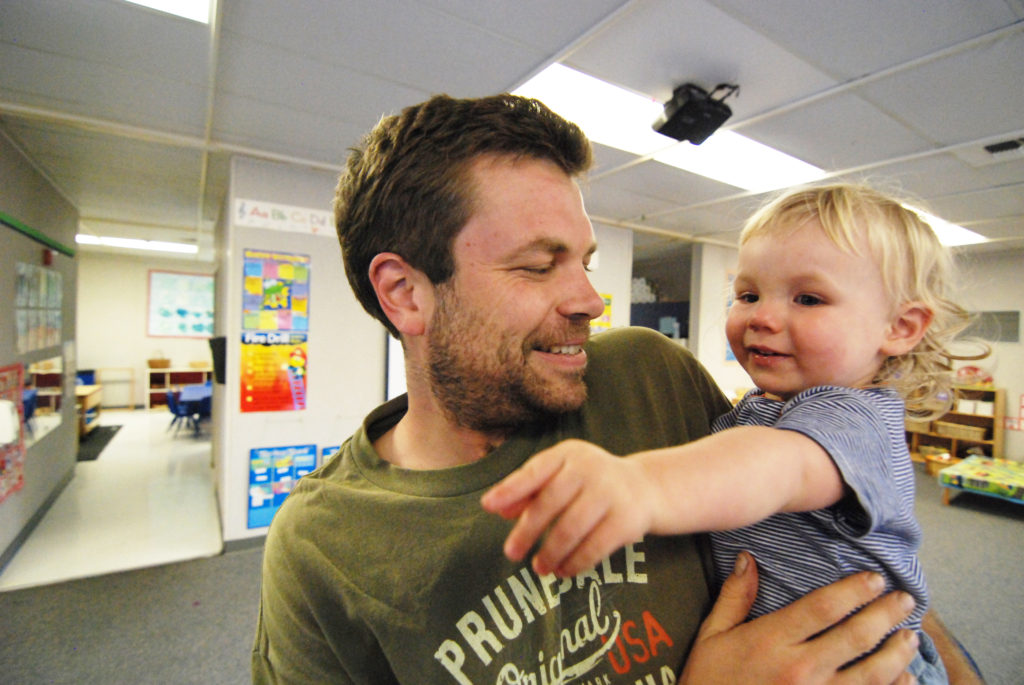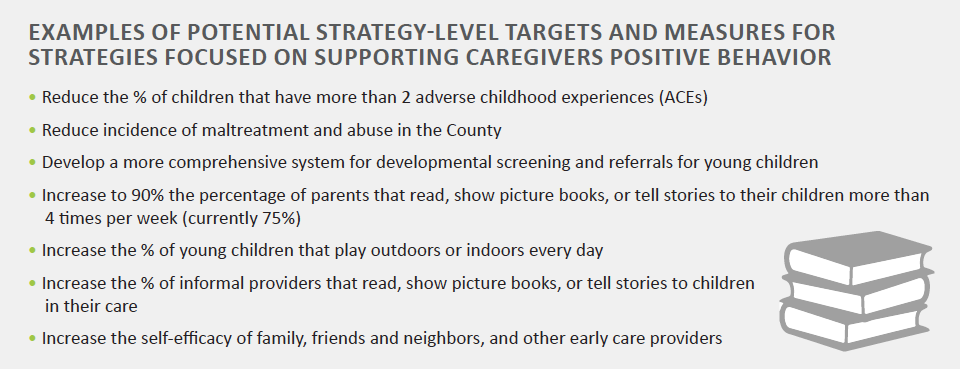 4. ALL CAREGIVERS USE POSITIVE, DEVELOPMENTALLY-SUPPORTIVE BEHAVIORS
4. ALL CAREGIVERS USE POSITIVE, DEVELOPMENTALLY-SUPPORTIVE BEHAVIORS
This key driver is about how caregivers behave towards and interact with children on a regular basis, in all care settings. An important part of caregiver behavior is knowledge and awareness, including accurate information about child development and appropriate expectations for children’s behavior at every age. Such knowledge can help caregivers see their children in a positive light and promote their healthy development. Caregivers are influenced by information from many sources, including family members as well as parent education classes and surfing the internet. Studies show that information is most effective when it comes at the precise time caregivers need it to understand their own children or children in their care. Caregivers who experienced harsh discipline or other negative childhood experiences may need extra help to change the parenting patterns they learned as children.
Caregiver behavior that supports each unique child’s optimal development is defined as the physical, social, and emotional back and forth interactions between parents/caregivers and young children that:
- are mutually engaging and positive in affect,
- responsive and sensitive to children’s communicative abilities and social/emotional needs,
- and allow children to establish secure expectations that their needs will be met.
4.1 Embed parenting and child development supports in health and other public services
This strategy involves integrating supports for early childhood brain development and supportive parenting behaviors for development and pre-literacy learning (“talk, read, sing, play” etc.) into other settings serving families, specifically through pediatricians and service providers. It also supports parents as their child’s first teacher. This strategy would support healthy child development and effective parenting and has been proven to increase access to the guidance, support, and resources needed to raise healthy families. The specific activities would be further developed with deep involvement of local families and service providers to ensure that it is relevant, culturally-responsive and well adapted to their daily realities.
In the local context, we have identified two priority settings – one universal and one targeted – in which we will look at scaling up supports: pediatrician offices (health clinics) and Women, Infants and Children (WIC), which serves low-income families. Children enrolled in WIC represent a high percentage of the children least-well prepared for kindergarten, and are a population that is already designated as high risk.
The focus of the strategy would be to fund additional staff/volunteer supports to complement WIC staff and enhance the mental health, child development, parenting and early literacy components of the program. We will explore rolling out programs based in pediatricians’ offices (with professionals embedded in the primary care team) that help families identify, understand and manage parenting challenges like feeding, behavior, sleep, and adapting to life with a young child.
4.2 Support family, friend and neighbor caregivers (FFN)
Local data show that the more time children spend in informal care with a non-relative, the less likely they are to be well prepared when they start school. Informal providers often provide affordable care, are familiar, easy to access and trusted by families, and match the home language and ethnicity of the children in their care (which some families view as particularly important). While some informal providers offer excellent quality and special connections with the children in their care, others are not providing optimal experiences and are the only care available for parents who cannot afford other options.
This strategy would build on local pilots to provide capacity development and technical support through play groups for Family, Friend and Neighbors (FFN) Caregivers. During play groups, trained facilitators provide modeling, coaching, and support to help increase participants’ knowledge of child development and how to best support each child’s learning and development. It would aim to directly improve the quality of informal caregiver behavior and also improve the home environment. Different types of FFNs (paid/ unpaid, family or non-family, etc.) would benefit differently, and supports would be tailored to their unique relationships to the children in their care, and individual professional goals.
4.3 Provide more effective parenting programs
This strategy involves providing additional support for parenting education and development programs throughout the County. This strategy would focus on supporting relationship-based approaches, using adult learning theory and child development science. It would also ensure that programs are well-adapted to local cultures and context. Effective parenting programs support parents with core concepts, values, knowledge and skills needed to understand their role, and to change or support behaviors that are developmentally appropriate for children. Parenting programs are currently provided in a variety of settings, including through the healthcare system, at schools, and by community-based organizations. For example Opening Doors/Abriendo Puertas, is a workshop program that supports parents in their roles as family leader and as their child’s first and most influential teacher.

3 The term “caregivers” is used to mean anyone taking care of or responsible for young children, in any setting, and can include people such as: parents, teachers, early care educators, childcare providers, nannies, grandmas, family friends, and coaches.
For a complete list of references and data sources please click here.
